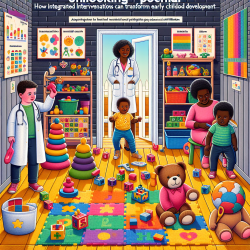Introduction
As practitioners dedicated to the well-being of children, we understand the profound impact that communication can have on a child's development. A recent study titled Communicating with children about ‘everyday’ pain and injury: A Delphi study sheds light on how we can leverage everyday pain experiences to promote resilience and adaptive behaviors in young children. This research provides valuable insights that can be integrated into our practice to enhance outcomes for the children we serve.
The Power of Communication
The study highlights that everyday pain experiences are critical in shaping children's beliefs and behaviors regarding pain and injury. These experiences, influenced by social, cultural, and environmental contexts, form the foundation of a child's understanding of pain, which they carry into adulthood. Therefore, how we communicate about these experiences can significantly influence their development.
Key Findings from the Delphi Study
The Delphi study engaged 18 experts, including specialists in pediatric pain, trauma, child development, psychology, educators, and parents. Through a series of three survey rounds, a consensus was reached on 187 items, identifying 12 key themes for effective communication about everyday pain. Here are some pivotal strategies:
- Role Modeling: Children learn a great deal by observing adults. Practitioners and caregivers should model calm and positive responses to pain.
- Empowering Language: Use language that empowers children to express their feelings and encourages them to engage in active coping strategies.
- Discussion Opportunities: Facilitate discussions during and after a painful experience to help children process their emotions and learn adaptive responses.
- Emotional Development: Support the child's emotional development by acknowledging their feelings and validating their experiences.
Integrating Research into Practice
As practitioners, integrating these strategies into our interactions with children can foster a more supportive environment that encourages resilience and adaptive behaviors. Here are some practical steps you can take:
- Incorporate role-playing scenarios in therapy sessions to practice positive pain responses.
- Educate parents and caregivers on the importance of their responses to children's pain and provide them with tools to support their child effectively.
- Create resources or workshops that focus on developing children's emotional intelligence and coping strategies.
Encouraging Further Research
While this study provides a strong foundation, further research is essential to continue improving our understanding and practices. Practitioners are encouraged to explore additional studies and contribute to the growing body of knowledge in this area. By staying informed and engaged, we can continue to enhance the outcomes for the children we serve.
To read the original research paper, please follow this link: Communicating with children about ‘everyday’ pain and injury: A Delphi study.










